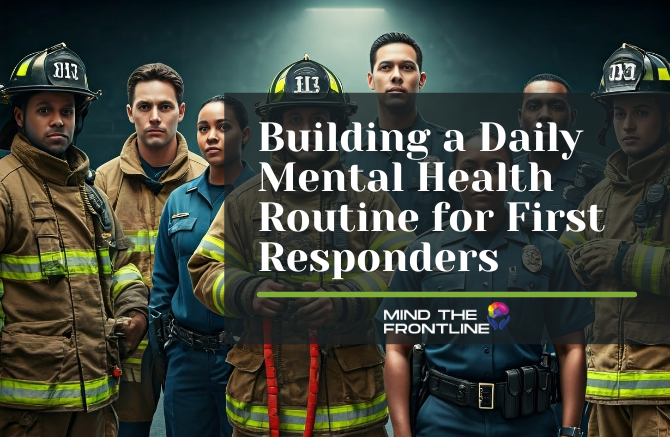Building a Daily Mental Health Routine for First Responders
First responders face unique mental health challenges due to the nature of their jobs. Building a daily mental health routine can be a powerful tool...
6 min read
 Chris Smetana, AS, FP-C, CCP-C, NRP | Founder/President
:
Mar 26, 2025
Chris Smetana, AS, FP-C, CCP-C, NRP | Founder/President
:
Mar 26, 2025
-3.png)
Unlock the secrets to holistic well-being by mastering the four pillars of self-care, crucial for first responders and veterans.
Self-care is a comprehensive and intentional series of activities that you engage in to safeguard and nurture your physical, mental, emotional, and spiritual health. It encompasses a wide range of practices aimed at taking care of yourself, ensuring that you are doing things that not only improve your mood but also ease anxiety and stress, ultimately contributing to maintaining optimal well-being. This holistic approach to health is essential because true health and well-being extend far beyond the mere absence of injury, disease, or infirmity. Instead, it represents a harmonious state of wholeness that integrates the mind, body, soul, and our surrounding environment. In essence, self-love is synonymous with self-care, as it involves prioritizing your own needs and well-being. Below, we delve into the four major pillars of self-care, each of which plays a crucial role in ensuring a balanced and healthy life. These pillars should not be taken lightly if you aspire to lead a life that is not only healthy but also fulfilling and enriched with a sense of purpose and contentment.
-Mar-18-2025-08-31-47-0367-PM.png?width=401&height=262&name=Blog%20Section%20Pictures%20(5)-Mar-18-2025-08-31-47-0367-PM.png)
Physical self-care is probably the most common form of self-care we know, but it also means so much more than just the basics. It involves maintaining a healthy lifestyle, which encompasses a balanced diet rich in nutrients, vitamins, and minerals essential for the body's optimal functioning. Healthy eating is not just about consuming the right foods but also about understanding portion control and the timing of meals to ensure sustained energy levels throughout the day. Regular exercise is another critical component, which includes a variety of physical activities such as cardiovascular workouts, strength training, flexibility exercises, and even recreational sports that keep the body agile and strong. Body hygiene is equally important, involving daily practices like bathing, dental care, and skincare routines that protect against infections and promote a sense of freshness and confidence.
Moreover, physical self-care includes taking medication for physical and mental illnesses when needed, ensuring that you follow prescribed treatments and consult healthcare professionals regularly to monitor your health status. It also means being proactive about preventive care, such as getting regular check-ups, vaccinations, and screenings to catch potential health issues early.
Physical self-care means not neglecting your physical needs and avoiding over-self-medicating, which can lead to dependency and other health complications. It involves not abusing drugs, alcohol, or anything else that actively harms your body or makes you feel unhealthy. This includes being mindful of the substances you consume and understanding their effects on your body and mind. By prioritizing physical self-care, you can enhance your overall health and well-being, leading to increased energy levels, improved mood, and a greater ability to handle life's challenges with resilience and strength.
-3.png?width=401&height=262&name=Blog%20Section%20Pictures%20(6)-3.png)
When you practice emotional self-care, you make a conscious decision to surround yourself with individuals who genuinely appreciate, understand, and support your emotional well-being. This supportive network can include close friends who offer a listening ear, family members who provide unconditional love, or organized support groups that offer a safe space to share and navigate through emotional challenges. These connections are vital as they provide a sense of belonging and validation, which are crucial for emotional health.
In addition to building a supportive community, there are several other strategies for emotional self-care that can significantly enhance your emotional resilience and stability. Journaling is a powerful tool that allows you to express and explore your thoughts and feelings in a private and reflective manner, helping you gain clarity and insight into your emotional state. Seeking therapy from a professional can provide you with expert guidance and coping strategies tailored to your specific needs, offering a structured environment to work through complex emotions. Practicing mindfulness, which involves being present and fully engaged in the moment without judgment, can help you manage stress and anxiety, leading to a more balanced emotional state. These activities collectively contribute to processing emotions effectively, building resilience against emotional setbacks, and maintaining a harmonious emotional balance, ultimately leading to a more fulfilling and emotionally healthy life.
-3.png?width=401&height=262&name=Blog%20Section%20Pictures%20(7)-3.png)
The mind is an incredibly powerful aspect of our being, influencing not only our thoughts and emotions but also having a profound impact on our physical well-being. It serves as the control center for our entire body, orchestrating everything from basic physiological functions to complex emotional responses. Mental self-care, therefore, is essential for maintaining this intricate balance and involves a variety of activities designed to keep your mind sharp and resilient. Engaging in activities such as reading, which stimulates cognitive function and enhances vocabulary, or learning new skills, which can boost confidence and provide a sense of accomplishment, are excellent ways to nurture mental health. Additionally, participating in creative hobbies like painting, writing, or playing a musical instrument can offer an outlet for self-expression and stress relief, further contributing to mental clarity and emotional stability.
Stress is a pervasive factor in modern life that can significantly undermine mental health, leading to issues such as anxiety, depression, and even physical ailments like headaches or high blood pressure. By actively practicing mental self-care, you can effectively reduce stress levels, thereby lowering the risk of developing more serious mental health conditions such as chronic depression and anxiety disorders. This proactive approach helps in maintaining a healthy mindset, which is crucial for overall well-being. Techniques such as meditation, which promotes mindfulness and relaxation, cognitive-behavioral strategies that help reframe negative thought patterns, and relaxation exercises like deep breathing or progressive muscle relaxation can be incredibly effective. These practices not only help in managing stress but also enhance mental resilience, allowing you to navigate life's challenges with greater ease and confidence.
-3.png?width=401&height=262&name=Blog%20Section%20Pictures%20(8)-3.png)
Spiritual self-care involves a variety of practices that are designed to foster a deeper connection with your higher self or a higher power, which can be a source of profound comfort and guidance. This connection can be nurtured through activities such as prayer, where you engage in a dialogue with the divine, seeking wisdom, solace, or gratitude. Meditation is another powerful practice, allowing you to quiet the mind and open yourself to inner peace and insight, often leading to a heightened sense of awareness and spiritual clarity. Spending time in nature can also be a deeply spiritual experience, as it allows you to witness the beauty and interconnectedness of all living things, fostering a sense of awe and reverence for the world around you. Engaging in religious or spiritual communities provides a supportive environment where you can share beliefs, participate in rituals, and find encouragement from others who are on a similar spiritual journey. These practices collectively help you find meaning and purpose in life, which is crucial for overall well-being. By connecting with something greater than yourself, whether it be a divine presence, the universe, or the collective human spirit, you can experience a profound sense of peace, fulfillment, and resilience. This connection can provide strength during challenging times, offering a sense of belonging and a deeper understanding of your place in the world.
-3.png?width=401&height=262&name=Blog%20Section%20Pictures%20(9)-3.png)
Integrating the four pillars of self-care into your mental health routine can significantly enhance your overall well-being by providing a comprehensive framework that addresses the multifaceted nature of health. Each pillar—physical, emotional, mental, and spiritual—supports different aspects of health, creating a balanced and holistic approach to self-care that ensures no part of your well-being is neglected. By focusing on these diverse areas, you can cultivate a more resilient and adaptable lifestyle that is better equipped to handle the stresses and challenges of daily life.
To begin this transformative journey, start by assessing which areas of your life need the most attention. This might involve reflecting on your current habits, identifying any gaps in your self-care practices, and considering how each pillar can be incorporated to address these needs. Once you have a clearer understanding of where to focus, gradually incorporate practices from each pillar into your daily routine. For instance, you might start with simple physical activities like walking or stretching, introduce mindfulness exercises to enhance emotional resilience, engage in mental challenges such as puzzles or learning new skills, and explore spiritual practices like meditation or spending time in nature.
Remember, self-care is a deeply personal journey, and finding what works best for you may take time and experimentation. It's important to be patient with yourself and recognize that self-care is not a one-size-fits-all solution. Consistency and commitment to these practices are key, as they can lead to a healthier, more fulfilling life. Over time, as you integrate these pillars into your routine, you may notice improvements in your energy levels, emotional stability, mental clarity, and spiritual fulfillment, ultimately contributing to a more balanced and enriched existence.
-1.png?width=401&height=262&name=Blog%20Section%20Pictures%20(10)-1.png)
Don't Suffer Alone!
Get your copy of Back in Service: Frontline Stories of Resilience. This collection includes stories from frontline workers and their families from across the country with each author sharing a unique story about how their career has impacted them and details on how they have grown into a rejuvenated lifestyle of resilience.

Explore many valuable First Responder Mental Health and Wellness resources on Mind the Frontline's online platform. Discover the link below to access a wide range of support and information tailored specifically for first responders.
Additional Mind the Frontline Resource's
Stay connected with Mind the Frontline on Facebook & LinkedIn.
$BI-TAPP $50 DISCOUNT OFF CODE:frontline40
Transform Peer Support in Your Agency with Mind Shield LMS
At Mind the Frontline, we’re proud to introduce Mind Shield LMS, a game-changing platform designed to empower first responder peer support programs.
Key Features:
✅ Automated Educational & Motivational Emails
✅ Streamlined Follow-Up Task Creation
✅ Comprehensive Resource Library
✅ Customizable Dashboard
Why Mind Shield LMS?
✨ Boost efficiency: Automate routine tasks and focus on meaningful support.
✨ Ensure no one is left behind: Every request is tracked and addressed.
✨ Equip your team: Provide tools and resources for effective peer support.
💻 Start Today! Request a free 30-day trial and see the impact firsthand.
📩 Get Started Now: Request More Information
Join us in prioritizing the mental health and wellness of first responders. Together, we can build stronger, more resilient teams.

First responders face unique mental health challenges due to the nature of their jobs. Building a daily mental health routine can be a powerful tool...
-2.png)
Inner child healing offers transformative benefits for first responders and veterans, helping them navigate the emotional scars of their demanding...
.png)
First responder families face unique challenges, making self-care essential for maintaining mental and emotional well-being. This blog explores...